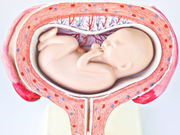For singleton pregnancies, increased odds of severe maternal morbidity, although rate down since 2008
THURSDAY, Dec. 17, 2015 (HealthDay News) — For singleton pregnancies, conception with assisted reproductive technology (ART) is associated with increased risk of severe maternal morbidity, according to a study published in the January issue of Obstetrics & Gynecology.
Angela S. Martin, M.D., from Emory University in Atlanta, and colleagues examined trends in severe maternal morbidity from 2008 to 2012 in delivery and postpartum hospitalizations among ART- and non-ART-conceived pregnancies.
Overall, 1.5 percent of the 1,016,618 deliveries were identified as pregnancies conceived with ART. The researchers found that the most common severe morbidity indicator for ART and non-ART pregnancies was blood transfusion. Per 10,000 singleton deliveries there were 273 ART deliveries or postpartum hospitalizations with severe maternal morbidity, compared with 126 for non-ART (P < 0.001). From 2008 to 2012, the rate of severe morbidity decreased from 369 to 219 per 10,000 deliveries for ART singleton deliveries (P = 0.025). For ART versus non-ART singletons the odds of severe morbidity were increased (adjusted odds ratio, 1.84). No significant difference was seen in the rate of severe morbidity between ART and non-ART pregnancies among multiple gestations (P = 0.089).
“Singleton pregnancies conceived with ART are at increased risk for severe maternal morbidity; however, the rate has been decreasing since 2008,” the authors write.
Full Text (subscription or payment may be required)
Copyright © 2015 HealthDay. All rights reserved.








